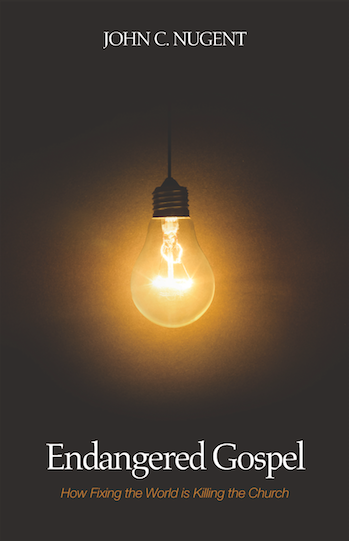 In his exceptional new study, Endangered Gospel: How Fixing the World is Killing the Church, John Nugent speaks of God’s design as the “better place.” Nugent’s approach is a full biblical narrative of the new heavens and the new earth (the final Better Place) and in a series of post we have examined almost all of Nugent’s narrative. There are some unique and important contributions in his narrative (e.g., an early focus on the Powers) and some other elements that join with other narrative approaches (Wright, Bartholomew-Goheen, and yours truly), but what makes Nugent’s book special is that he knows the difference between the “world” and the “church.”
In his exceptional new study, Endangered Gospel: How Fixing the World is Killing the Church, John Nugent speaks of God’s design as the “better place.” Nugent’s approach is a full biblical narrative of the new heavens and the new earth (the final Better Place) and in a series of post we have examined almost all of Nugent’s narrative. There are some unique and important contributions in his narrative (e.g., an early focus on the Powers) and some other elements that join with other narrative approaches (Wright, Bartholomew-Goheen, and yours truly), but what makes Nugent’s book special is that he knows the difference between the “world” and the “church.”
Most political Christians today do not make sufficient distinction between the world and the church. Most think what the Bible says to Israel or to the church is for the nation (hence, they ask if America is a Christian nation?) — is the ape a polar bear? This is a fundamental mistake of the highest order and leads to all sorts of attempts to Christianize the nation through the coercion of the majority (which is what voting is). But the world is not the church and the church is not the world, and Nugent knows it.
So, he summarizes four approaches to the Better Place:
- Heaven centered: salvation is in heaven, there will be a future interruption, and God replaces the fallen order. BUT there is little to no emphasis on salvation on earth, there is little concern with the restoration that begins with Jesus, and also no emphasis on Christians beginning to fix the fallen order to make the world a better place.
- Human centered: salvation is on earth and the Christians are called to make the fallen order into a better place in the here and now; BUT there is little emphasis on salvation in heaven, the restoration that began with Jesus is minimized, there is little belief in a future interruption, and no emphasis on God replacing the fallen order.
- World centered: again, salvation is on earth, a restoration has begun with Jesus, and there is a belief in a future interruption along with a belief that Christians are to begin fixing the fallen order in the here and now; BUT again little emphasis on salvation in heaven and God replacing the fallen order.
Nugent proposes what he calls Kingdom centered. Yes, nearly all of the proponents of the first three think they are also the kingdom centered approach — kingdom after all is the word du jour today. But how does Nugent see it?
4. Kingdom centered: salvation is on earth and the restoration began with Jesus and there will be a future restoration and most importantly God will replace the fallen order. That is, there is no emphasis on going to heaven when we die for the salvation of God will the flourishing of the created order as the new creation in the new heavens and the new earth. What distinguishes this view from the world centered view (Nugent sees the world centered view in NT Wright) is it is not the design of God for Christians to make this world into a Better Place for that is God’s call.
The call of the Christians is to BE the Better Place in the here and now.
The first three views nearly always minimize the church. This is why in my Kingdom Conspiracy I emphasized that the kingdom is not simply a “rule, reign” but a “realm” and a people. Much kingdom talk today has little concern for the church, either universal and especially local. So I showed that the OT evidence clearly and uniformly equates the word “kingdom” with a “people.” It is a people governed by the king (YHWH, Jesus) by listening to and obeying that king’s law for living in the land.
Nugent does much the same here with the mission of God: it is the mission of the church to BE the Better Place, not to make the world into that better place. The disciples of Jesus already wanted to replace evil rulers with one of themselves and Jesus gave to them what still works today: he rebuked them for arrogance and impatience.
Jesus’ disciples needed no power over the kingdoms of this world because God had given them a different kingdom with a different view of power. They already occupied important posts in Jesus’ kingdom and, in time, they would serve as judges among God’s people. Presiding over rival human kingdoms was not their place. That would actually be a demotion! (113)
Friends, if Christians of the Left and Right today would use the same energies they have for this election for the work of God’s kingdom in Christ — evangelism, mission, disciple-making, church-building — this nation would be changed. Not by the coercion of majority voting but by the embodiment of a whole new way of life.
It’s not that the kingdom-centered view wants the world to get worse. Rather, it is not interested in dressing up the old order in new clothes (114).
To extend the words of Nugent: it wants to undo the old order not by putting on new clothing but by calling the old order out of the old order into the new order.





